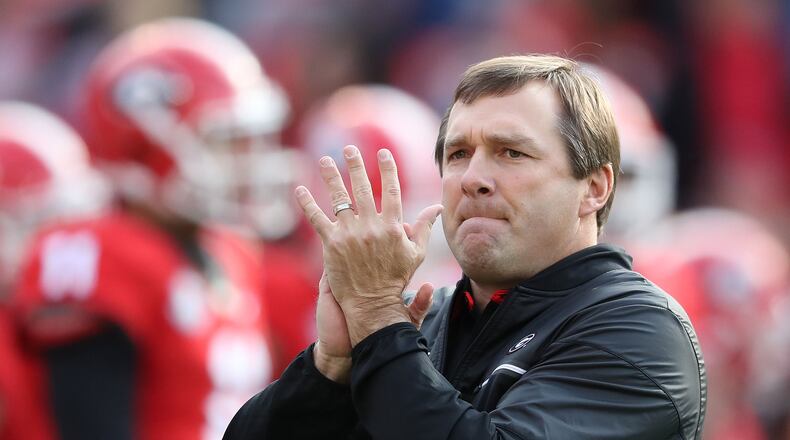As debate has stirred over the past few days over whether college football players should have the temerity to skip a third-rate bowl game in the interest of protecting their bodies and intended financial futures, something occurred to me: What is it about sports that makes people assume a game so insignificant that it will be forgotten in five minutes is more important than real life?
Because isn’t this about individual choice?
LSU’s Leonard Fournette and Stanford’s Christian McCaffrey have decided to skip their school’s respective bowl games, something that could become commonplace in players valued highly before the NFL draft. Georgia coach Kirby Smart said Tuesday of this new but not totally stunning development, “It’s a concern in college football. I certainly think kids look at, ‘Where’s my predicted financial value?’ and also, how important is this game, how important is (playing) to your teammates, how important is it to the development of your team?”
But then came this: “Some coaches would argue: Does it matter that much? Because I’m trying to develop my team for the future and that guy’s not going to be there, anyway.”
And there’s your reality, not some Norman Rockwell view of major college athletics that frankly hasn’t existed since, well, Norman Rockwell passed on to an idyllic village in the afterlife.
I fully support Fournette's and McCaffrey's decisions. They are not walking out on their teammates in the middle of a regular season or before a college football playoff game. They are walking out before after-thought exhibitions, the Citrus and Sun Bowls -– just like Houston coach Tom Herman walked out of that job before the Las Vegas Bowl to go to Texas.
Oh, I’m sorry. Is that not the same thing?
People want to judge Fournette, who battled an ankle injury and is looking out not only for his financial future but also that of his young daughter? People want to judge McCaffrey, who also battled injuries this season and has gained insight into the world of professional sports from his father, Ed McCaffrey, who had a 13-year NFL career as a wide receiver (and also was Stanford educated)?
It’s so easy to judge when you’re not faced with that decision, when keeping your limbs and cranium intact for a few more months significantly affects your future income.
A year ago, Notre Dame linebacker Jaylon Smith suffered a major knee injury in the Fiesta Bowl. He dropped from being a possible top-five pick into the second round. Smith received $800,000 from an injury insurance policy but that didn’t nearly make up for the difference in guaranteed salary given last year’s fifth and 34th overall picks in the NFL draft: $18.377 million.
In the aftermath of Fournette’s and McCaffrey’s decisions, and with the likelihood of similar pre-bowl defections in the future, Smith said he didn’t regret playing in the Fiesta Bowl. It’s the right thing to say now, whether or not it’s not the truth. But even if Smith is being genuine, you can’t blame other athletes for factoring his injury and lost income into their decision.
That doesn’t make them selfish. That makes them smart.
We've seen enough examples recently of athletics having a powerful platform and influencing social and political change. College athletes also are looking out for themselves with increasingly regularity.
Maybe this isn't exactly like Northwestern players threatening to unionize or Missouri players protesting against campus racism or Minnesota players vowing (briefly) over the suspension of 10 teammates, stemming from sexual assault allegations. But it's another example of college athletes feeling empowered and looking out for themselves and, in this case, their future. Get used to it.
Stanford coach David Shaw said of McCaffrey’s decision, “We understand that this was a very difficult decision. For three years Christian has not only been a great player, but a great teammate as well. We wish him great success at the next level…”
Georgia Tech coach Paul Johnson said he also understood the players’ mindset of skipping a bowl, even if, “Personally, I don’t think I would’ve done it.
“I don’t know that I would do that to my teammates but I can understand the rationale behind it if I was going to be a first-round player. …. It’s a physical game and I guess every game you play and every practice you ran that risk.”
Does Johnson expect more of this in the future?
“Everything is trending in that direction. I don’t know if it’s just guys looking out for themselves. You can see there’s a lot of outside influences on people. I’m sure there’s a lot of agents and attorneys involved with those decisions.”
Georgia Tech senior quarterback Justin Thomas said of Fournette and McCaffrey, “That’s a decision they had to make for themselves.”
Teammate Dedrick Mills, a freshman, said, “As a player, that’s their decision. Me, I want to play every game that I can. I’d like to have that memory.”
Mills’ comments align with former Ohio State running back Ezekiel Elliott, who Tweeted, “All these young guys deciding to skip their bowl games. I would do anything to play one more time with my brothers in that scarlet and gray.”
He backed off slightly after learning of Fournette’s past injuries. But the point is unchanged: All must decide what is best for themselves. Because playing in one more bowl simply doesn’t hold the value others want to put on it.
Subscribe to the, “We Never Played The Game” podcast with Jeff Schultz and WSB’s Zach Klein on iTunes. All episodes can be downloaded and heard on iTunes or via WSBRadio.com. New episodes every Monday and Thursday.
About the Author
Keep Reading
The Latest
Featured


